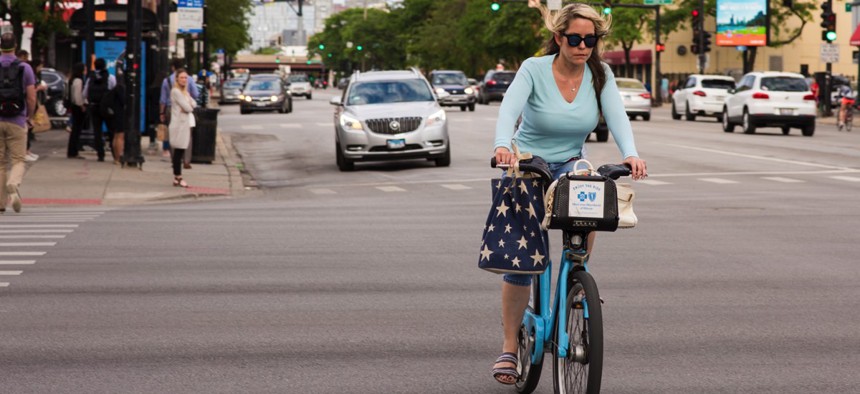Chicago Is 1st Major City to Make Bike Shares Lock to Something

A woman rides a Divvy bike in Chicago. The city hopes dockless bike sharing will complement the existing system and other mobility options.
The ‘lock to’ requirement will be phased in as part of a six-month pilot in the city’s South Side.
Chicago’s dockless bike-share pilot project launched Tuesday with a “lock-to” requirement, meant to curb bicycle litter, that other cities have been slower to adopt.
A maximum of 50 free-floating bikes is allowed per participating company, and they’re expected to convert to lock-to technology—bikes that lock to something—by July 1.
The city allows bikes locked to designated public bike racks and corrals, covered bike parking shelters, retired parking meters, and street signs, so long as they don’t block the sidewalk for pedestrians.
“In our conversations with stakeholders including local residents, advocates, and in speaking with other cities that have implemented or are considering similar dockless bike-share pilot programs, right-of-way usage was raised as a serious issue to consider,” the Chicago Department of Transportation said in an announcement. “The lock-to requirement, along with other requirements in the permit, establish a baseline standard that will help address right-of-way usage issues that may arise, for example, a stray bike left in the right-of-way.”
Chicago is the first of the 10 largest U.S. cities to mandate lock-to tech, in part because it weeds out major dockless players like Lime Bike, Ofo and Mobike from full participation. Dallas plans to take up bike-share regulations without such a provision later this month.
Zagster’s dual-locking Pace line will ramp its total number of bikes up to the maximum 250 during the six-month pilot.
“I think a number of major cities will look at what Chicago is doing with this pilot and decide this is the right approach for them as well,” Tim Alborg, Zagster director of public policy and government relations, told Route Fifty by phone. “We are seeing serious repercussions from free-floating dockless bikes as they’ve been deployed across the country.”
A lock-to requirement mitigates bike litter’s impacts on pedestrians and people with disabilities in particular, he added, creating a more sustainable environment for bike-sharing.
The pilot is limited to Chicago’s South Side, so the city can study how dockless bike share complements other transportation options—bus, rail, ride share, taxi, and an existing bike-share system Divvy—before expanding service.

Boulder, Colorado will be the next city to consider lock-to requirements on June 12, while Austin, Texas recently passed an emergency ordinance temporarily banning e-scooters—another setback for Lime Bike, which operates there—until they could be licensed starting Tuesday.
Getting more people out of cars has always been Zagster’s goal, Alborg said of e-scooter competitors, but parking “needs to be done responsibly.”
Dave Nyczepir is a News Editor at Government Executive’s Route Fifty and is based in Washington, D.C.
NEXT STORY: Solar Designation Program Taps 200th U.S. Community






